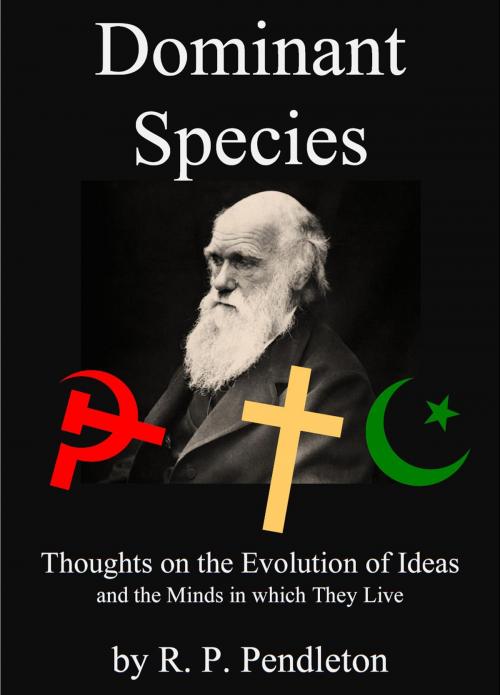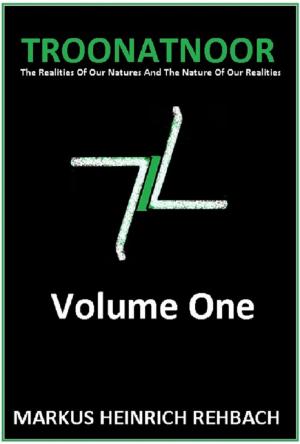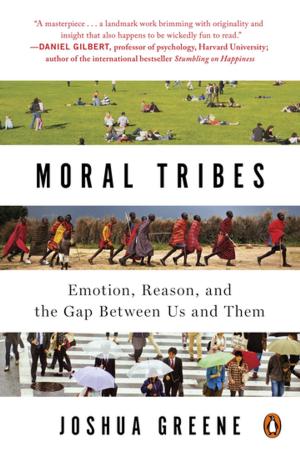Dominant Species: Thoughts on the Evolution of Ideas and the Minds in which They Live
Nonfiction, Science & Nature, Science, Biological Sciences, Evolution, Religion & Spirituality, Philosophy, Ethics & Moral Philosophy| Author: | R. P. Pendleton | ISBN: | 9781301312269 |
| Publisher: | R. P. Pendleton | Publication: | June 6, 2013 |
| Imprint: | Smashwords Edition | Language: | English |
| Author: | R. P. Pendleton |
| ISBN: | 9781301312269 |
| Publisher: | R. P. Pendleton |
| Publication: | June 6, 2013 |
| Imprint: | Smashwords Edition |
| Language: | English |
"As organisms are what evolve in the biological phase of evolution, so cultures are what evolve in its psychosocial or human phase." --Julian Huxley (1958).
Dominant Species examines the most important aspect of evolution for us--cultural evolution, the natural selection of ideas. The greatest threat to the world for some time now has been the enslavement of millions of minds to ideas that have become self-propagating and self-reproducing. Religions, political ideologies, scientific theories, and concepts of all sorts live or die depending on how they affect the people who believe them. Fundamental Darwinian insights about the way the world organizes itself help us understand how ideas survive, spread, and influence minds and behavior.
Challenging and unorthodox in style and substance, this book offers a different way of looking at the ideological and religious conflicts now determining the future of the world. It includes extensive notes and references, drawing on the work of notable evolutionary thinkers from Darwin to the present, including Herbert Spencer, William Graham Sumner, Julian Huxley, Garrett Hardin, E. O. Wilson, Richard Dawkins, David Sloan Wilson and others.
The author argues that we live in a thoroughly Darwinistic world, where high levels of organization, effectiveness and efficiency are maintained and improved by continuous competition, feedback and adaptation. The resulting organization takes the form of a coordinated harmony of 1) structure and function, 2) organisms and their environments, and 3) (perhaps most important of all) people and their beliefs.
Popular scientific theories from biology to psychology to economics reorganize society, redefine what is true and false, right and wrong, the achievable purposes of human action, and the meaning of life. Each new revelation shows us more of our relation to things—that is, our meaning. The lessons of evolution are still obscured by the disastrous consequences of the ideologies (e.g., Nazism) based on early attempts at social Darwinism. In this book, special, extended attention is given to the ethical implications of a world driven by natural selection, in particular, the selection processes affecting our ethical ideas. There is reason to hope that, as Darwin himself believed, the capability to make ethical judgments, like any useful trait, will tend to be improved by experience.
Nevertheless, we must be aware of certain worrisome tendencies, such as an apparently fundamental conflict between efficiency and freedom. This topic is treated at some length.
The dead weight of outdated, exploded and contradictory cosmologies lies heavily on humanity. In our ideology-ridden world, reading certain books is considered dangerous. This is one of them. Reading it might free your mind to pursue your own purposes, rather than those of parasitic idea-organisms.
Second Edition, revised 2017.
The author is a systems engineer and management consultant with degrees in physics and systems science.
"As organisms are what evolve in the biological phase of evolution, so cultures are what evolve in its psychosocial or human phase." --Julian Huxley (1958).
Dominant Species examines the most important aspect of evolution for us--cultural evolution, the natural selection of ideas. The greatest threat to the world for some time now has been the enslavement of millions of minds to ideas that have become self-propagating and self-reproducing. Religions, political ideologies, scientific theories, and concepts of all sorts live or die depending on how they affect the people who believe them. Fundamental Darwinian insights about the way the world organizes itself help us understand how ideas survive, spread, and influence minds and behavior.
Challenging and unorthodox in style and substance, this book offers a different way of looking at the ideological and religious conflicts now determining the future of the world. It includes extensive notes and references, drawing on the work of notable evolutionary thinkers from Darwin to the present, including Herbert Spencer, William Graham Sumner, Julian Huxley, Garrett Hardin, E. O. Wilson, Richard Dawkins, David Sloan Wilson and others.
The author argues that we live in a thoroughly Darwinistic world, where high levels of organization, effectiveness and efficiency are maintained and improved by continuous competition, feedback and adaptation. The resulting organization takes the form of a coordinated harmony of 1) structure and function, 2) organisms and their environments, and 3) (perhaps most important of all) people and their beliefs.
Popular scientific theories from biology to psychology to economics reorganize society, redefine what is true and false, right and wrong, the achievable purposes of human action, and the meaning of life. Each new revelation shows us more of our relation to things—that is, our meaning. The lessons of evolution are still obscured by the disastrous consequences of the ideologies (e.g., Nazism) based on early attempts at social Darwinism. In this book, special, extended attention is given to the ethical implications of a world driven by natural selection, in particular, the selection processes affecting our ethical ideas. There is reason to hope that, as Darwin himself believed, the capability to make ethical judgments, like any useful trait, will tend to be improved by experience.
Nevertheless, we must be aware of certain worrisome tendencies, such as an apparently fundamental conflict between efficiency and freedom. This topic is treated at some length.
The dead weight of outdated, exploded and contradictory cosmologies lies heavily on humanity. In our ideology-ridden world, reading certain books is considered dangerous. This is one of them. Reading it might free your mind to pursue your own purposes, rather than those of parasitic idea-organisms.
Second Edition, revised 2017.
The author is a systems engineer and management consultant with degrees in physics and systems science.















